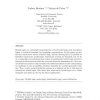199 search results - page 23 / 40 » Description Logics: Foundations for Class-based Knowledge Re... |
JAPLL
2006
13 years 8 months ago
2006
Hybrid logics are a principled generalization of both modal logics and description logics, a standard formalism for knowledge representation. In this paper we give the first const...
ECOOPW
2000
Springer
14 years 8 days ago
2000
Springer
Abstract. Classification is a central concept in object-oriented approaches such as object-oriented programming, object-oriented knowledge representation systems (including descrip...
ENTCS
2006
13 years 8 months ago
2006
Conventional approaches to the modeling of autonomous agents and agent communication rely heavily on the ascription of mental properties like beliefs and intentions to the individ...
GIS
1992
ACM
14 years 22 days ago
1992
ACM
Machine learning techniques such as tree induction have become accepted tools for developing generalisations of large data sets, typically for use with production rule systems in p...
JOLLI
2007
13 years 8 months ago
2007
This paper presents an approach to artificial intelligence planning based on linear temporal logic (LTL). A simple and easy-to-use planning language is described, PDDL-K (Planning...

